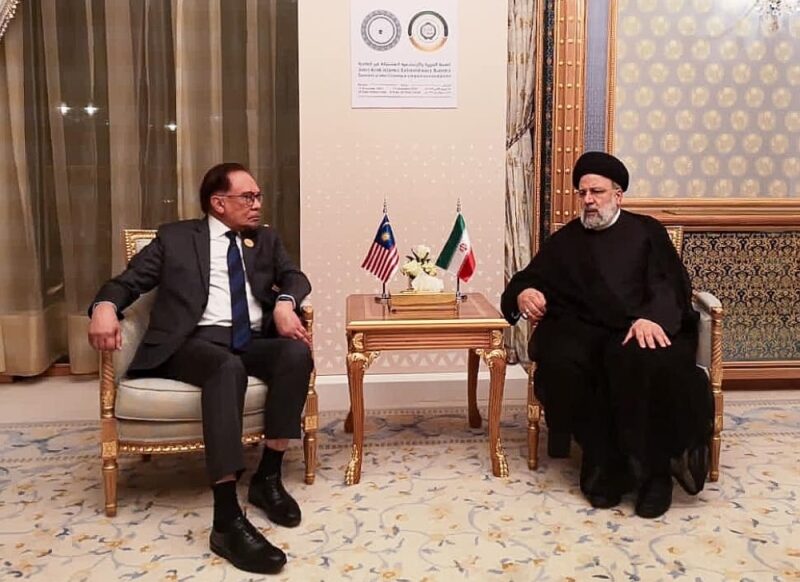FRESH AIR
Malaysia’s role in supporting Iran’s terrorism
May 23, 2024 | Alana Schetzer

Iran is using Malaysia as a gateway to finance its terrorism activities – including Hamas’ ongoing deadly attacks against Israel – according to the United States Government.
Iran is exploiting companies based in the south-east Asian country to avoid multiple international sanctions on the sale of its oil, the proceeds of which are used to finance the country’s various terror proxy groups.
Brian Nelson, the US Treasury’s Undersecretary for Terrorism and Financial Intelligence, recently visited Malaysia and Singapore as part of the Treasury’s increasing crackdown on Iran’s revenue-raising and financing in the region.
Nelson said Iran is using multiple companies in the region to move its heavily restricted oil near Singapore and around south-east Asia. The oil is then sold illegally. In December, the Treasury announced sanctions against four Malaysian companies involved in Iran’s production of drones. Iran has been supplying Russia with thousands of drones to use in its war against Ukraine; Nelson recently said these sanctions have been “effective”.
During his visit, Nelson said Malaysian operators were using “ship-to-ship transfers, particularly at night” to move Iranian oil. “They are really designed to obfuscate the origin of the commodity, in this case, Iranian oil.”
He added that tugboat operators and port administrators were among those who were complicit in the scheme, by obscuring the name of the ships, turning off location devices, and falsifying or forging critical documents about these ships’ cargo manifests.
According to Thomas Daniel from the Institute of Strategic & International Studies Malaysia, Iranian oil is transferred by a “dark fleet” of tankers, falsely rebranded as “Malaysia Blend”, and then sold at a heavily discounted price to small Chinese refineries. The practice is so pervasive that it makes Malaysia – on paper – the world’s fourth largest oil exporter to China.
Daniel added that despite Washington’s concerns, Malaysia’s maritime authorities are underfunded and thus cannot properly patrol the country’s waters, including the 574,000 sq km of its exclusive economic zone. “[The Malaysian Maritime Enforcement Agency], despite being Malaysia’s frontline maritime law enforcement agency, has long suffered from a lack of resources and assets to carry out its mandate,” Daniel added.
Reuters recently reported on an increase in money flowing from Malaysia to Iran and its terror proxies via the Malaysian financial system. However, Malaysian Prime Minister Anwar Ibrahim denied this: “Not one shred of evidence has been adduced [that] there were ship-to-ship transhipments in international waters,” he said. “We do not have the capacity to observe or monitor that.”
Ibrahim made the comments during a trip to Qatar – which provides financial support to Hamas – where he also met Hamas leader Ismail Haniyeh. Photos show the two smiling, laughing and shaking hands.
Malaysia and Iran – Hamas being one of the latter’s 13 proxy terrorist groups – have long had close ties. Their economic trade has been increasing in recent years before taking major leaps since Hamas’ horrific October 7 terror attacks; Iran is now Malaysia’s third biggest trading partner in the Middle East and is one of the few countries in which Iranian citizens can travel without a visa.
Malaysia, Hamas and October 7
Malaysia – an officially Muslim country – has had a strong anti-Israel foreign policy for decades, including banning Israeli passport holders from entering the country. Malaysia is one of the most hostile nations against Israel outside of the Middle East, with old-fashioned antisemitism having become normalised within Malaysian culture.
After the October 7 attack, Ibrahim refused to cut ties with Hamas, saying he would “not punish” the terrorist organisation for carrying out the largest massacre of Jews in a single day since the Holocaust.
Following a spate of increasingly anti-Israel rhetoric, Malaysia banned Israel-flagged cargo ships from Malaysian ports in December 2023. However, the ban will have a negligible economic impact – only four such ships docked in Malaysian ports in 2023.
Hamas militants and officials also reportedly operate in Malaysia, specifically at the offices of the Palestinian Cultural Organisation Malaysia (PCOM), which is funded by Kuala Lumpur. The PCOM is considered the unofficial embassy for Hamas in Malaysia. Haniyeh and fellow Hamas leader Khaled Mashal have visited Malaysia in recent years, hosted by Anwar’s predecessor, long-serving PM Mahathir Mohamad.
Hamas terrorists have reportedly even trained on Malaysian soil. As far back as 2014, reports stated that Hamas operatives undertook paragliding training in the south-east Asian country. Multiple Hamas terrorists penetrated the Israeli border on October 7 using paragliders to carry out their horrific campaign of rape, mutilation, torture, murder and kidnapping.
Some experts believe the recent meeting between Ibrahim and Haniyeh could lead to further scrutiny from the US and potentially even additional sanctions.
The sanctions move by the United States follow a plan announced in November to sanction Hamas’ foreign supporters, which would include several countries, including Malaysia, South Africa, and Qatar.
Malaysian Home Minister Saifuddin Nasution Ismail said that the country only recognises sanctions imposed by the United Nations, and not by individual countries. “I emphasised that we will only recognise sanctions if they are imposed by the United Nations Security Council,” he said.
Jonathan Schanzer, senior vice-president for research at the Foundation for Defense of Democracies, said the Malaysian Government is “playing a dangerous game.”
“The [Malaysian] government’s open embrace of Iran and Hamas has not only led to the assassination of several Hamas operatives on Malaysian soil. It may soon lead to sanctions or other punitive measures,” he said.
RELATED ARTICLES

US Middle East strategy amid regional instability: Dana Stroul at the Sydney Institute






















